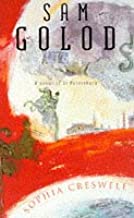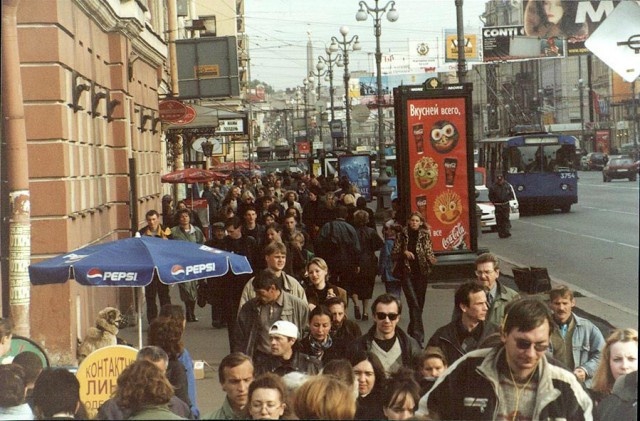Part two of this review is here.

Sophia Creswell’s Sam Golod (1996) is one of those works written by English writers who spent time in Russia during the extraordinary 1990s and sought to describe in prose those searingly memorable years.
A. D. Miller does this superbly in Snowdrops. In non-fiction, Susan Richards’s Epics of Everyday Life reports lyrically and movingly from her travels in Russia as the Soviet system collapsed in 1990.
Sam Golod is not a name, but a Russian phrase meaning ‘hunger itself’, which serves as a fleeting motif in the novel (and makes a poor title). It is the story of a young English woman, Natalie, spending a post-university year in St Petersburg, just as the Soviet state has collapsed, teaching English.
Natalie falls in with a group of Russian ‘artists’, and in love with one in particular. It turns out that they have ties into the Russian mafia, and soon Natalie finds herself out of her depth as events get out of hand.
This much is clear from the back-cover blurb, and makes it all sound a bit pretentious. It is not. The plot turns out to be thriller-like in its twists and turns, and I was surprised to find myself sitting up into the small hours in order to finish it.
Perhaps the book that Sam Golod brings to mind most of all for me is Charlotte Hobson’s wonderful memoir of a year in Voronezh as a student in 1991-92, Black Earth City. Sam Golod is set in the same year and likewise tracks the relationship of the female narrator with a Russian lover during a year in which the old certainties were finally stripped away, exposing the elemental heart of Russia.
In 1922 Boris Pilnyak published Голый год (The Naked Year), set in the post-revolutionary chaos of 1919, as the arrival of the Communist regime saw its chief manifestation in the removal of the civilisational veneer in Russia, and millions found themselves struggling for existence and meaning under a new (dis)order, falling into that gap between the departure of the outgoing system and the establishment of what came next. Pilnyak’s motif is that a recognisably western-type system was peeled away exposing the ‘Asiatic’ nakedness of Russia. 1991 likewise saw an elementally naked Russia revealed, as old certainties were abruptly ripped away.

The excellent ‘English Russia’ blog has a post of about 50 photos of St Petersburg in the 1990s. The setting of Sam Golod right there. I even reckoned I could spot a few of the characters …
I don’t want to burden Sophia Creswell with comparing Sam Golod to the work of Boris Pilnyak in terms of literary merit. This blog is rarely about Literature with a capital ‘L’. (As explained here).
Sam Golod is though an engaging first novel. May be because I lived on and off in Russia during the early 1990s there were moments early on in reading Sam Golod when I thought of not bothering to continue reading a book which struck me as the rather naïve and wide-eyed creative writing of a twenty-something western woman, thrilled to have been on hand as Russia’s ‘Wild East’ emerged from the wreckage of the Communist system.
I was wrong to think that and right to read on. In fact, I’m really glad that I persevered, as Creswell —through her central character— turns out to be more knowing than I first thought. At one point towards the end she has Natalie, the first-person authorial narrator, rounded on by a friend who accuses her of the same faults as I did.
It was a game, a traveller’s tale for dinner parties in Clapham. They will tell you about awful loos in India and you’ll be able to upstage them with stories of romantic Russian artists. It was an experience, wasn’t it? You wanted to get out and see the world, and now you are a bit shocked, poor dear … when you got tired you were just going to return to England.
sam golod, p. 176
I was wrong about Cresswell’s naivety. She is more self-knowing than that. I was wrong too about the strength of her plotting.
Part two of this review is here.